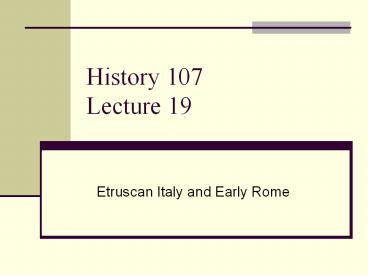History 107 Lecture 19 PowerPoint PPT Presentation
1 / 10
Title: History 107 Lecture 19
1
History 107Lecture 19
- Etruscan Italy and Early Rome
2
Etruscan Italy
- The Etruscans originated in central Italy
- Dominated central Italy 1000 B.C. to 750 B.C.
- Not a branch of the Indo-European language group,
but basically original peoples of central Italy - Etruscan remains small buildings, pottery and
terra cotta artwork, inscriptions (based on Greek
alphabet), and a few cities - Etruscan religion polytheistic rituals involve
entrails and examining naturals patterns (birds,
etc.)
3
Etruscan Italy
- Etruscan artwork emphasizes dynamic movement,
expressions, and lively human forms (Stacey, p.
185) - Etruscan women had more rights that other ancient
women public access, education, limited voting,
matrilineal naming - Gifts to Rome from Etruscan civilization
Etruscan Arch and gladiatorial combat - About 50 A.D. the Roman Emperor Claudius wrote a
history of the Etruscans that became influential
4
Etruscan Art Pottery and Mythology
- Etruscan Italy
- 7th century B.C.
- Odysseus and his men kill the giant Polyphemus
- Influence of Greek style and mythology
5
Etruscan Art Sculpture
- Etruscan Italy
- 6th century B.C.
- Terracotta funeral sculpture (sarcophagus)
- Reclining couple
6
Greeks in Italy
- In the 6th and 5th centuries B.C., Greeks
colonized Italy - Greeks stay in the South and Etruscans stay in
central Italy - Greeks founded towns of Croton, Naples, and
Syracuse (on Sicily) - Pythagoras and even Plato got away from it all
by moving to Italy for a time - Etruscans and later Italians absorb Greek
culture, including alphabet, religious concepts,
art, mythology, government - Geography point Italy vs. Greece (farms vs.
ports)
7
The Coming of the Romans
- The Romans or Latins were not the original
inhabitants of Rome, but came to Italy from the
North (beyond the alps) c. 1000 2000 B.C. - Romans eventually imagined themselves to be
descendents of the Trojans through Aeneas, who is
mentioned in Homers Iliad and is the subject of
Virgils book The Aeneid. - Romans basically say that they are from the same
warrior stock as the Greeks - Romans found Rome c. 753 B.C. on Tiber River
- Early Roman culture community based
- Rather than constant jealousy, Roman communities
extended rights to others in terms of commercial
contracts, marriage rights, and citizenship.
8
Early Rome
- Romans expand slowly, ousting the Etruscans and
dominating the Greeks, until the whole of modern
Italy is in their control c. 265 B.C. - Each new community receives the same basic
rights - Romans initially ruled by a monarchy, but become
interested in democracy and elect a Senate - In 534 B.C. an Etruscan named Tarquin the Proud
rules Rome as a tyrant. - In 510 B.C. Tarquin apparently raped Lucretia,
the virtuous wife of a Roman noble, and this
triggers a rebellion against the Etruscans.
9
Republican Rome
- In 500 B.C. Rome as refounded as a republic
- King replaced by 2 consuls elected by the
citizens - Slaves, women, and foreigners could not vote
- Senate also elected and controls the use of
public funds - Only aristocrats (patricians) can be elected as
senators, a source of bitterness for the other
citizens (plebeians) - A comparison Roman republic vs. Greek
democracy - Roman checks and balancesmonarchical,
oligarchic, and democratic principles worked
together in institutions such as the plebian
council, Senate, consul, tribune, judge, and
administrator
10
Conflict Patricians vs. Plebeians
- After 500 B.C. increasing tension between
patricians and plebeians - Patricians are aristocrats who own most property,
hold public offices, and run Roman society - Plebeians are small farmers, artisans,
foreigners, tradesmen, etc. Not all the
plebeians are poorsome are just new money - Plebeians forced to fight in Roman wars but
cannot serve as officials - Plebeians complain that they dont receive equal
treatment under the law, and that there are no
written laws - All laws are customary
- In 450 B.C. a plebeians victoryThe Law of the
Twelve Tables is written down and becomes Romes
written law - In 367 B.C. plebeians get another small
victorythey can elect people to a plebian
council. By 287 B.C., plebian council can pass
legislation that is binding

